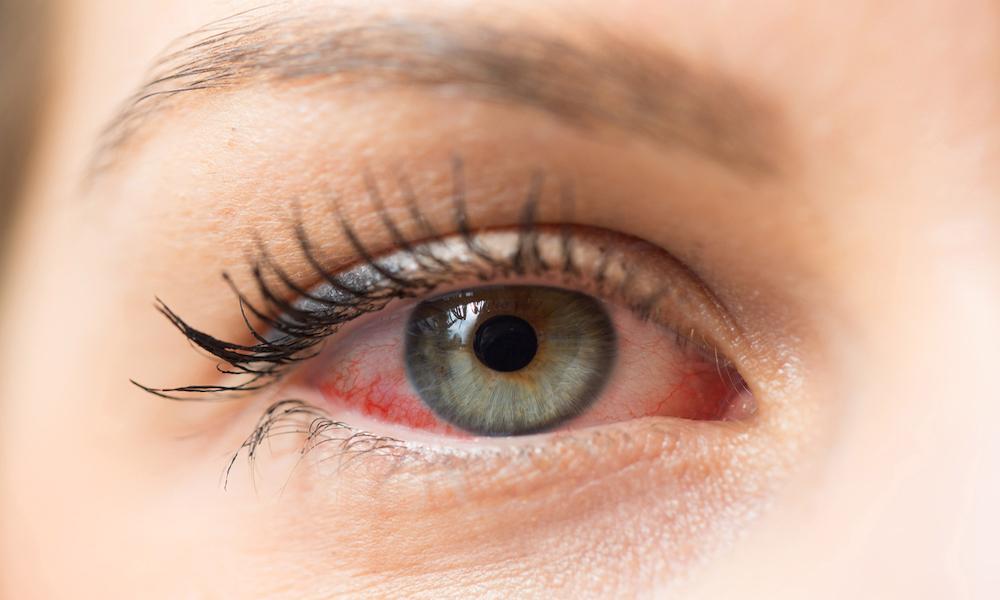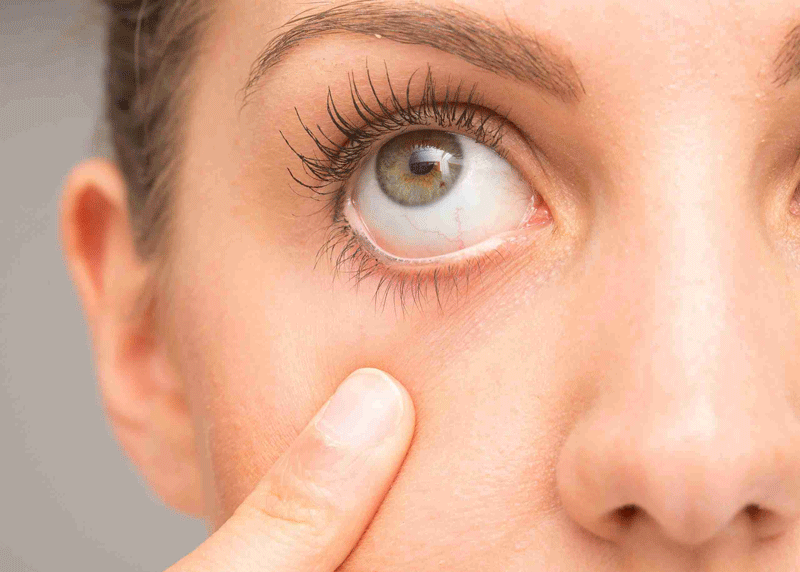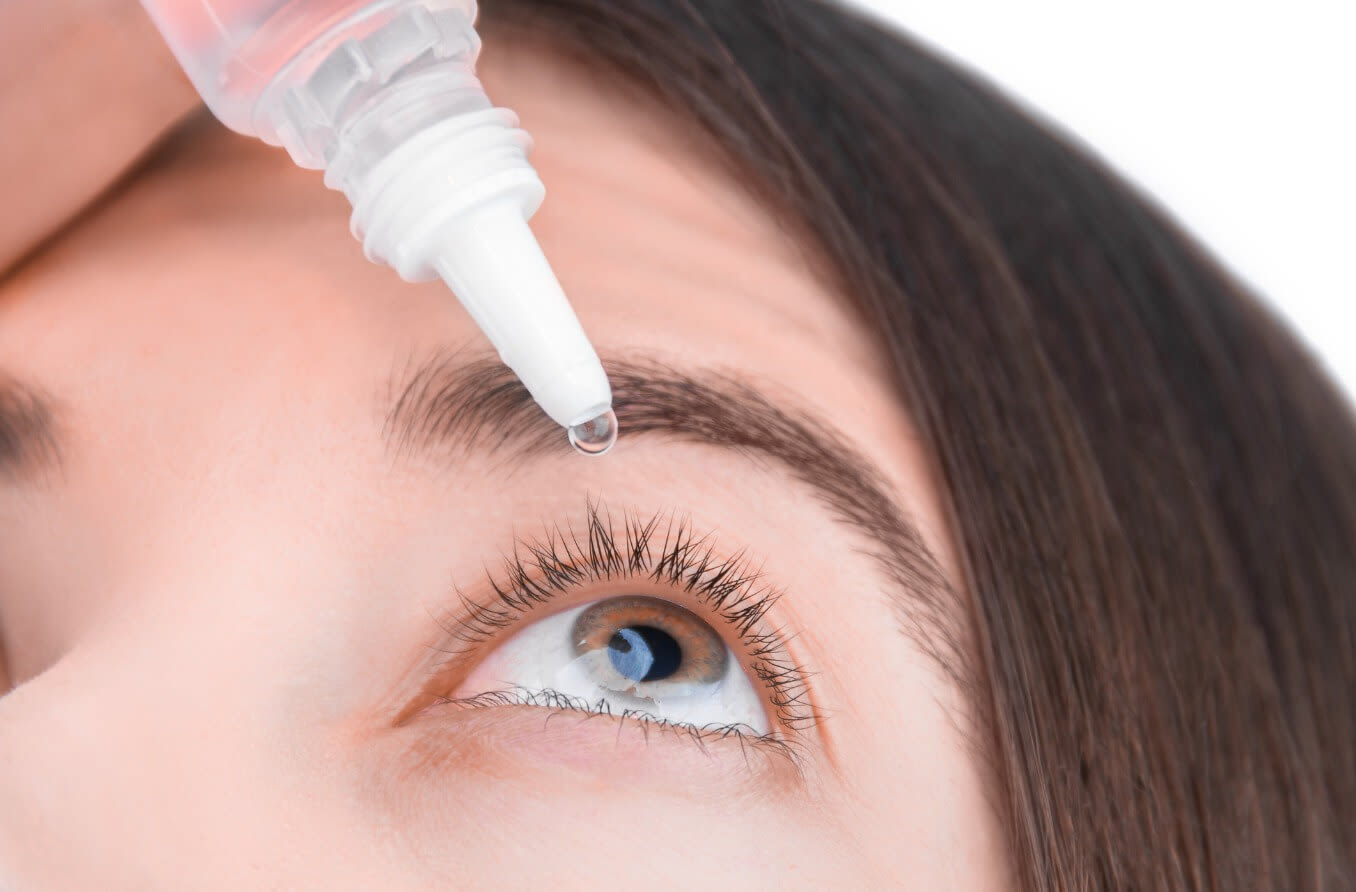
Dry eyes, a common ocular condition, can significantly impact daily life. Nearly 16 million Americans have dry eyes. While many cases can be managed with over-the-counter remedies and lifestyle adjustments, recognizing the underlying causes and when to consult a primary care doctor in Southington, CT, is essential for effectively managing this condition.
Dry eye is a condition that occurs when your eyes don’t produce enough tears to stay properly lubricated, or when the tears are of poor quality and evaporate too quickly. In some cases, dry eyes can also cause an overproduction of the wrong tears, leading to watery eyes as the body tries to compensate for the dryness.
The tears your eyes produce are three layers: oil, water, and mucus. The oil layer helps prevent evaporation of the water layer, the water layer moisturizes, and the mucus layer ensures even distribution of tears over the eye’s surface. When any part of this tear production process is disrupted, it can result in dry eye.
Recognizing these signs is crucial for timely intervention, including seeking professional medical care from a primary care doctor in Southington, CT.
One of the primary symptoms of dry eyes is eye irritation, often accompanied by redness. This discomfort arises from the inadequate lubrication of the ocular surface, leading to friction and inflammation.
Individuals with dry eyes commonly experience a burning or stinging sensation in their eyes. This discomfort may worsen with prolonged screen time or exposure to environmental triggers such as smoke or dry air. Proper diagnosis and treatment from a primary care doctor in Southington, CT, are essential to alleviate these symptoms effectively.
Dry eyes can heighten sensitivity to light, a condition known as photophobia. This symptom can exacerbate discomfort and interfere with daily activities, especially in brightly lit environments.
Prolonged periods of screen time or intense visual tasks can exacerbate symptoms of dry eyes, leading to eye fatigue or strain. If these symptoms persist despite rest or adjustments in visual habits, consulting a primary care doctor in Southington, CT, can help identify contributing factors and provide recommendations for relief.
Blurry vision is a frequent complaint among individuals with dry eyes, particularly after prolonged periods of visual concentration. Inadequate tear film can distort vision, leading to difficulty focusing and optical clarity.
Many individuals with dry eyes report feeling as though there is a foreign object or grittiness in their eyes. This sensation, known as ocular surface irregularity, results from insufficient tear film.
Paradoxically, dry eyes can sometimes trigger excessive tearing as the eyes attempt to compensate for the lack of adequate lubrication. This phenomenon, known as reflex tearing, can confuse individuals and may require expert evaluation from a primary care doctor in Southington, CT, to differentiate from other ocular conditions.
Individuals with dry eyes often struggle with wearing contact lenses comfortably. Insufficient tear production can lead to discomfort, lens intolerance, and increased risk of complications such as corneal abrasions.
Persistent redness, discharge, or swelling of the eyes may indicate an underlying infection or inflammation. These symptoms warrant evaluation by a primary care doctor in Southington, CT, to determine the cause and prescribe necessary treatments such as antibiotics or anti-inflammatory medications.

The causes of this condition vary, ranging from environmental factors to underlying health issues. For those experiencing persistent symptoms in Southington, CT, consulting with a primary care doctor can provide a comprehensive evaluation and tailored treatment strategies.
Environmental factors such as dry air, wind, smoke, and air conditioning can develop or exacerbate dry eyes. Prolonged exposure to these conditions can accelerate tear evaporation, leading to insufficient lubrication of the eyes.
Certain medical conditions, including autoimmune disorders such as Sjögren’s syndrome, rheumatoid arthritis, and thyroid disorders, can disrupt the normal functioning of the tear glands. These conditions lead to decreased tear production and poor tear quality, requiring assessment from a primary care doctor in Southington, CT.
Hormonal fluctuations, particularly in women during pregnancy, menopause, or while taking oral contraceptives, can impact tear production and composition. These hormonal changes may exacerbate dry eye symptoms and require specialized management from a primary care doctor in Southington, CT, to restore ocular health.
As individuals age, natural changes in tear production and tear film composition occur, leading to an increased prevalence of dry eyes in older adults. Aging-related factors such as reduced blink rate, decreased tear volume, and changes in tear film stability contribute to ocular surface dryness. Regular eye examinations with a primary care doctor in Southington, CT, can help detect age-related dry eye issues.
Certain medications, including antihistamines, decongestants, antidepressants, and hormonal therapies, can affect tear production or quality, leading to dry eyes as a side effect. Lifestyle factors such as prolonged screen time, contact lens wear, and inadequate hydration can also exacerbate dry eye symptoms.
Eye surgeries, such as cataract surgery, can temporarily disrupt tear production or alter tear film dynamics, resulting in transient or chronic dry eye symptoms. Proper preoperative evaluation and postoperative management by a primary care doctor in Southington, CT, are crucial for minimizing dry eye complications and optimizing surgical outcomes.
Seeking timely medical attention for dry eyes alleviates discomfort and prevents potential complications. An early visit to a primary care doctor in Southington, CT, is crucial in effectively managing the condition. Here’s why making that decision is critical:
Early medical intervention from a primary care doctor in Southington, CT, can provide prompt relief from discomfort associated with dry eyes. Experienced primary care doctors in Southington, CT, like those from Docs Primary Care – Southington, can recommend or prescribe lubricating eye drops or other treatments to alleviate symptoms and improve eye comfort.
Timely managing dry eyes can help prevent complications such as corneal damage or infections. Primary care doctors in Southington, CT, can assess the severity of the condition and provide appropriate interventions to minimize the risk of complications.
Visiting a primary care doctor in Southington, CT, is pivotal for accurately diagnosing dry eyes. Through comprehensive assessments, including patient history, symptom analysis, and specialized tests like tear production evaluation and ocular surface examination, a doctor can pinpoint the exact cause — environmental factors, underlying health conditions, or medication side effects.
Primary care doctors in Southington, CT, can offer expert advice on managing dry eyes at home. It may include recommendations for eye care practices, lifestyle adjustments, or prescription medications to alleviate symptoms and promote eye health.
An early visit to a primary care doctor in Southington, CT, reassures individuals and their families experiencing dry eyes. Knowing that a medical professional is addressing the condition can alleviate anxiety and provide peace of mind during the treatment process.
Primary care doctors in Southington, CT, offer convenient access to medical services without needing an appointment. Their proximity to the community and availability during regular office hours ensure that individuals experiencing dry eyes can seek timely care.

While mild cases may respond to self-care measures, more severe or persistent symptoms necessitate intervention from a primary care doctor in Southington, CT.
Here’s an overview of treatment options tailored to address dry eyes effectively.
The primary treatment for dry eyes involves regular artificial tears, which provide lubrication and moisture to the eyes. These over-the-counter eye drops come in various formulations, including those designed for specific dry eye conditions. Your primary care doctor in Southington, CT, can recommend the most suitable artificial tears.
For moderate to severe dry eyes, prescription eye drops may be necessary to increase tear production, reduce inflammation, or prevent tear evaporation. Your primary care doctor in Southington, CT, can assess your condition and prescribe the appropriate medication.
In cases where tears drain too quickly from the eyes, punctual plugs may be inserted into the tear ducts to block drainage wholly or partially. It helps retain natural tears on the eye’s surface for longer, relieving dryness. Your primary care doctor in Southington, CT, can refer you to an eye specialist for this procedure if necessary.
Medications, such as antibiotics, are prescribed to reduce inflammation in the eyelids. This inflammation can obstruct oil glands, leading to reduced tear production. Oral antibiotics, as well as eye drops or ointments, may be recommended by eye care specialists to alleviate this condition.
Supplementing your diet with omega-3 fatty acids, found in fish or flaxseed oil, may help improve tear quality and reduce inflammation associated with dry eyes. Your primary care doctor can recommend appropriate supplements and dosages based on your medical history and needs.
A primary care doctor in Southington, CT, may suggest hydroxypropyl cellulose (Lacrisert) inserts for moderate to severe dry eye symptoms unresponsive to artificial tears. These small inserts, resembling clear grains of rice, are placed daily between the lower eyelid and eyeball, gradually releasing lubricating substances to alleviate discomfort.
Cholinergic medications (such as pilocarpine and cevimeline) boost tear production. They come in various forms including pills, gels, or eye drops. Potential side effects may include increased sweating.
While dry eyes can be uncomfortable and affect daily life, individuals can take several preventive measures to reduce the risk of developing this condition.
Conscious blinking helps spread tears evenly across the eyes’ surface, preventing them from drying out. When engaged in activities requiring prolonged visual focus, such as using digital devices or reading, remember to blink frequently to keep the eyes moist.
Dry indoor environments can exacerbate dry eye symptoms, especially in winter or air-conditioned spaces. Use a humidifier to add moisture to the air in your home or workplace, ensuring a comfortable humidity level that helps prevent the evaporation of tears.
Extended periods of screen time can contribute to dry eyes due to reduced blinking and increased evaporation of tears. To prevent this, follow the 20-20-20 rule: every 20 minutes, look away from your screen at something 20 feet away for at least 20 seconds. This habit encourages regular blinking and breaks your eyes from screen-related strain.
Wear wraparound sunglasses outdoors to shield your eyes from wind and UV rays. Additionally, consider using protective eyewear, such as goggles, in dusty or windy environments to prevent eye irritation.
Proper hydration is essential for maintaining overall eye health. Drinking adequate water throughout the day helps support tear production and prevents dehydration, which can exacerbate dry eye symptoms. Limit dehydrating beverages like caffeinated or alcoholic drinks, which can contribute to dryness.
Positioning yourself correctly while reading, working, or watching television can help minimize strain on your eyes. Ensure that your computer screen is at eye level and set about an arm’s length away from your eyes to reduce eye fatigue and encourage proper blinking.
Smoking harms your overall health and increases the risk of developing dry eyes. Quitting smoking or avoiding exposure to secondhand smoke can help reduce eye irritation and promote healthier tear production.
Regular visits to a reputable primary care doctor in Southington, CT, like those from Docs Primary Care – Southington, are crucial for maintaining eye health and addressing any concerns related to dry eyes. Your doctor can evaluate your symptoms, provide personalized recommendations for managing dry eyes, and refer you to an eye specialist if necessary.
Dry eyes and glaucoma are distinct conditions; dry eyes do not directly cause glaucoma. However, individuals with glaucoma may experience dry eyes as a side effect of some glaucoma medications, particularly those containing preservatives in certain eye drops. While dry eyes don’t lead to glaucoma, the two can coexist, complicating each other’s management and treatment. It’s important for patients with either condition to closely monitor their eye health and discuss any concerns with their primary care doctor in Southington, CT.
Several alternative therapies can complement traditional treatments for dry eyes. These may include using warm compresses to stimulate tear production or performing eyelid massages to improve oil gland function. However, you must consult your primary care doctor in Southington, CT, before trying alternative therapies to ensure they’re safe and suitable for your condition.
Dry eyes can affect nighttime vision for some individuals. Reduced tear production and inadequate lubrication can lead to discomfort, glare sensitivity, and fluctuations in vision quality, particularly in low-light conditions. If you’re experiencing difficulties with nighttime vision due to dry eyes, discuss these symptoms with your primary care doctor in Southington, CT.
Lack of sleep can contribute to dry eyes. During sleep, the eyes are naturally moisturized by tears, but insufficient sleep can disrupt this process, leading to decreased tear production and increased evaporation, resulting in dry eyes. Additionally, sleep deprivation can cause eye fatigue and irritation, exacerbating symptoms of dryness.
The duration of dry eye can vary widely among individuals. For some, it may be a temporary condition lasting only a few days or weeks, often resulting from environmental factors or specific stressors. For others, dry eye can be a chronic issue, persisting for months or even years without proper management. If you’re experiencing persistent discomfort or dryness while wearing contact lenses, it’s crucial to consult with your primary care doctor in Southington, CT.
Identifying the signs of severe dry eyes and understanding when to seek assistance from a primary care doctor in Southington, CT, is pivotal for effectively treating dry eyes. Rely on Docs Primary Care – Southington for compassionate and comprehensive care tailored to your ocular needs. Contact us today for a consultation!


During this surge in COVID-19 cases, our primary focus is meeting the high demand for tests, and we are seeing higher than usual wait times. This means we are unable to answer most phone calls. Please know that our teams are working very hard during this time to care for as many patients as safely as possible. Please click the button below for answers to common questions. We appreciate your understanding.